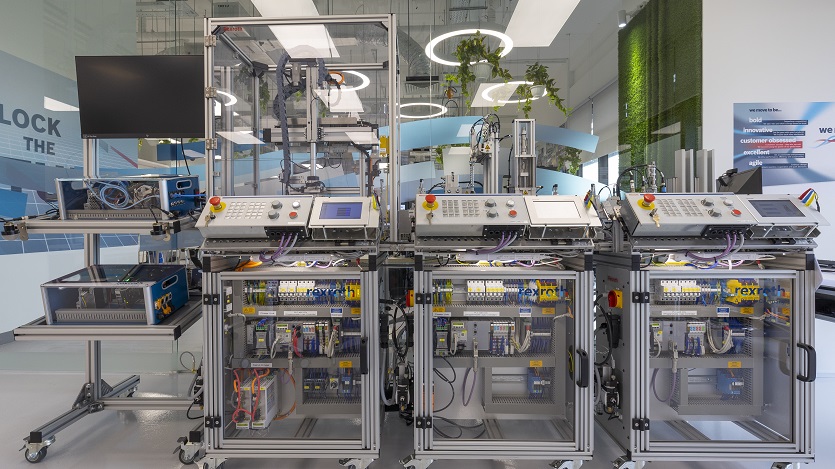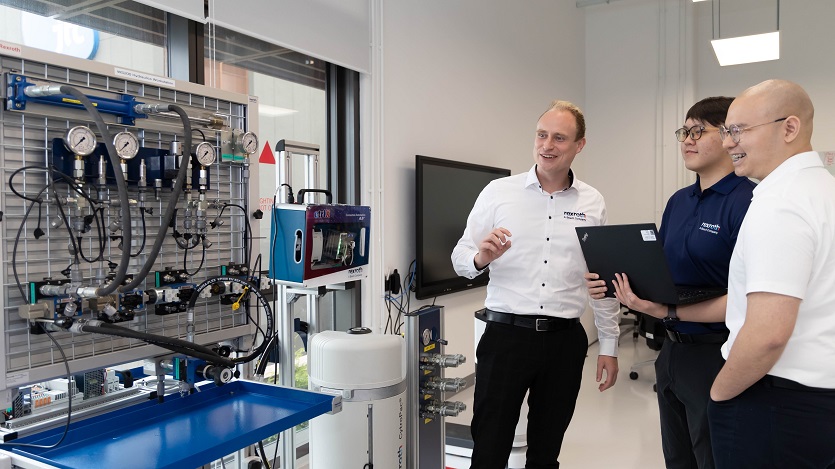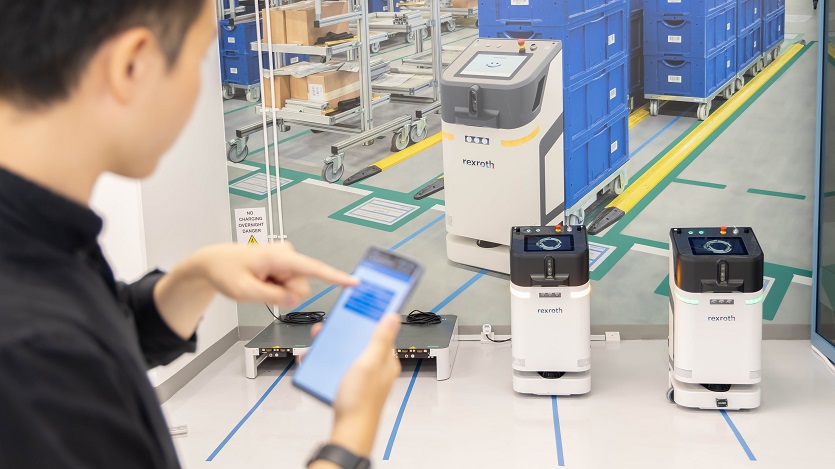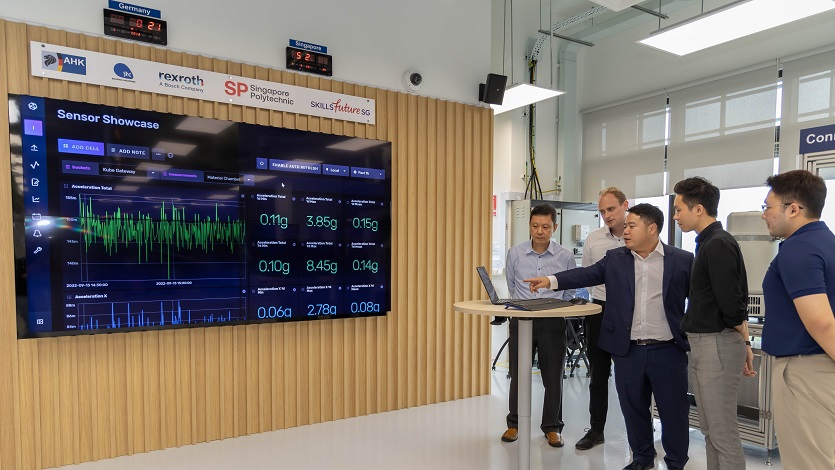
“Industry 4.0 (I4.0) is a tsunami, and whether you like it or not, you have to start preparing for its arrival,” says Mr Michel Gunawan, president and CEO of Bosch Rexroth ASEAN and Oceania. Taking it upon itself to help other companies, especially SMEs, prepare for the inevitable revolution, the German engineering firm has set up a new Bosch Rexroth Regional Training Centre (BRRTC) in Jurong Innovation District (JID). A collaboration between JTC, SkillsFuture Singapore (SSG), Singapore Polytechnic (SP), as well as Singaporean-German Chamber of Industry and Commerce (SGC), the centre offers initiatives aimed at educating companies on the benefits of I4.0 solutions, and accelerating their own digital transformation journeys.

The team at BRRTC, including Mr Michel Gunawan (fourth from right), Mr Javier Chan (third from right) and Mr Julian Siegler (last from right).
Unlocking new capabilities with data visibility
Bosch Rexroth believes the Internet of Things (IoT) system grants manufacturing companies capabilities like never before. Its implementation begins first with the ability to “speak” with the machines, explains Mr Gunawan. He adds: “To do that, you need to place sensors on the components, and gather data.”
Data is the key to making the leap from preventive to predictive maintenance, an advantage that allows companies to avoid malfunctions right from the get-go, and to detect wear and tear of machinery parts before they completely fail.
When its critical parts are being monitored and optimised to operate at peak performance, a machine can in turn produce consistent batches of high-quality products. Companies can minimise unforeseen downtime, which results in production bottlenecks and unnecessary material wastage.
If the benefits are so clear cut, why aren’t more companies embracing I4.0? Perceived high investment costs form part of the inertia. Companies, being used to their tried-and-tested systems, may also be hesitant about the reliability of emerging technologies.
With the establishment of BRRTC, Bosch Rexroth aims to convert minds and demonstrate the might of I4.0 solutions to companies in Singapore. The training centre is located within the same building as JTC’s Industry Connect Office at CleanTech Three, and it is also part of the larger network that includes the $400 million Hyundai Motor Group Innovation Center in Singapore (HMGICS), as well as Shimano Inc’s R&D hub.
“This proximity makes it even easier for us to connect with SMEs in JTC’s network that are keen on upskilling and reskilling their associates,” adds Mr Gunawan. “To spur innovation at a faster rate, one must consider different angles and perspectives, rather than go about it alone,” says Mr Gunawan. “Being a part of JID’s huge ecosystem allows us to take inspiration from the abundance of R&D and new ideas that are thriving here.”
Investing in talent
BRRTC’s marquee contribution to the JID ecosystem is its expertise in advanced manufacturing. Across its global network of over 260 plants, the company has connected some 120,000 machines and 250,000 devices to date.

Backed by Linux real-time operating system, web-based engineering and an IoT connection, Bosch Rexroth’s ctrlX AUTOMATION is an open system that helps build automation solutions. It is able to reduce component and engineering costs by 30 to 50%.
Its wealth of experience on I4.0 transformation makes it uniquely qualified to spearhead training programmes for other companies. On full display at the centre also are its proprietary technologies such as the mechatronics training system mMS 4.0, automated guided vehicles (AGVs) and ctrlX AUTOMATION platforms, with which participants of its programmes can enjoy hands-on learning. For newcomers, setting foot in a state-of-the-art facility can be overwhelming. The mMs 4.0 allows them to see and understand the entire advanced manufacturing cycle on a smaller scale.

A combination of our pneumatic, mechatronic and hydraulic hardware, sensors and RFID technology, the modular mMS 4.0 is an entire factory in miniature.
The centre partners with Singapore Polytechnic to offer the 10-day Industry Specialist AHK i4.0 programme, whose syllabus was developed in Germany by the Association of German Chambers of Industry and Commerce, Robert Bosch, Bosch Rexroth, as well as German companies and Institutes of Higher Learning.
“This programme equips specialists with the skills to devise specific proposals as well as select and implement methods and technologies that will meet the needs of their companies’ I4.0 transformations. At the end of the programme, many of them will be able to coordinate projects independently,” explains Mr Julian Siegler, specialist and master trainer at BRRTC.
Bite-sized courses on basic networking and applications of I4.0 for advanced manufacturing, as well as practical courses on open software controllers and condition monitoring, are available too. “Through these programmes, we hope to increase awareness of I4.0 solutions as well as fuel the adoption of advanced manufacturing technologies in Singapore,” adds Mr Siegler.

Made for the transportation of materials, these AGVs utilise lasers to scan the surroundings of environments such as warehouses.
Allowing companies to harness its technologies
If the training programmes introduce participants to I4.0 solutions, then BRRTC’s complementary Proof of Concept (PoC) initiative helps companies to see the potential return on investment that the solutions can yield.
“Each PoC acts as a test-bed for companies to start small and then scale up afterwards,” says I4.0 Applications Engineer and PoC Lead Mr Javier Chan. “The costs are also subsidised by SSG, thus lowering the barrier of entry and any associated risks.”
As part of the PoC initiative, companies will present BRRTC with a problem statement, after which the latter will propose a solution architecture comprising its technologies as well as third-party components. One of the I4.0 technologies that Bosch Rexroth brings to the table is its IoT gateway, which takes data mined from sensors and projects them on to a dashboard for visualisation.

Sensor data, from temperature to pressure and vibration, are projected on to a dashboard to enable real-time monitoring.
BRRTC has already developed several PoCs with local companies across different sectors. The projects span from monitoring humidity thresholds to preserve the quality of 3D printing materials to enabling predictive maintenance for a gigantic computer numerical control (CNC) machine. Besides reaping positive outcomes such as reduced overhead costs, the companies get a taste of how I4.0 will enhance their business operations.
Shaping an automated future together
As it revs up efforts to help other companies gear up for the era of I4.0, Bosch Rexroth continuously works on materialising its vision of a Factory of the Future. This factory is dynamic, connected, and offers variability. It’s where robots work directly with human colleagues, relieving them of difficult or dangerous tasks.
To achieve this vision, the company will have need for a generation of engineers who can conceive, design, and create boundary-breaking solutions. “Advanced manufacturing demands skills that are complex and cross-functional. Through BRRTC at JID, we hope to cultivate these skills, so that today’s engineers will eventually go on to develop cutting-edge resources that benefit not just their own companies, but also the collective industry,” says Mr Gunawan.
 A Singapore Government Agency Website
A Singapore Government Agency Website


